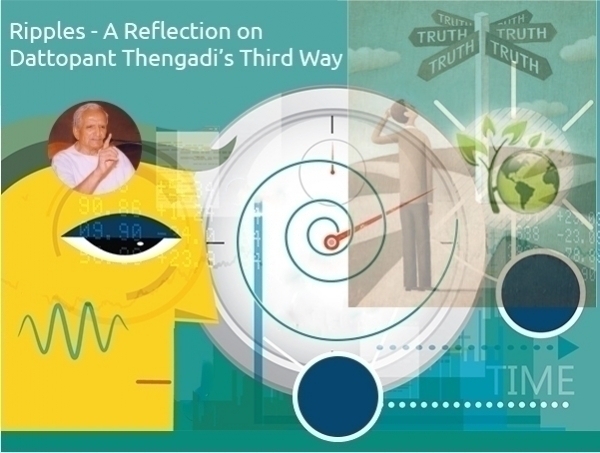Ripples A Reflection On Dattopant Thengadi's Third Way Part 55: On Revolution II
18 Aug 2022 10:00:56
I have been reflecting in my own way on Dattopant Thengadi Ji's Third Way. I present these small "ripples" that it has caused in my mind in a series. I am glad it has found its resonance in many thinking minds alike. I hope the readers have read the earlier article in the series before moving ahead.

Also Read: Ripples A Reflection On Dattopant Thengadi's Third Way Part 54
(On Revolution- The paper submitted at a meeting of the National Executive of Bharatiya Majdoor Sangh in 1976)
Dattopant describes the sins like boastfulness, overvaluing one's role, and many more to be avoided by the leaders of violent revolutions. He refers to Ho Chi-Minh who advised his followers to follow some principles like loving the soldiers, respecting the people, taking care of the public property and war booty, be open to criticism. Propaganda, secrecy etc too are given importance no doubt.
Favorable nature of the terrain (that is mountainous area) helps guerrillas and wars too. Even Airforce and artillery cannot work effectively against the revolutionaries in such regions.If the region is rural, thickly forested, and has an agricultural economy,it suits guerrilla activity. Military power faces many limitations in such situations. The Guerrilla can fight with simple weapons and be effective in spite of special forces and sophisticated weapons.( We can relate this to some of the present situations.)
Urban terrorism has limitations in the countries like India where the population is distributed differently.
Non-violent revolutionaries do not favor aid from foreign power though they value international propaganda. On the contrary, most of the successful revolutionary wars had the help of some or other foreign power. This fact is recorded in the history.( Dattopant refers to many such examples)
Of course, if the success of the revolution has an impact on the international order, usually there is a possibility of some aid and support.
Associated Press(is an American non-profit news agency headquartered in New York City, founded in 1846, dedicated to factual reporting, known for fast, accurate,and unbiased news) described the Viet Cong unit (The Viet Cong was an armed communist revolutionary organization in South Vietnam, Laos, and Cambodia.) initially was expected to fight with handmade weapons and sophisticated weapons were supposed to be captured from the enemy.
The arms are definitely important but the outcome depends ultimately on the people. Revolutionaries need full support from the area they are working in. Without popular support, it cannot succeed in spite of all the other factors.
The revolutionaries are not robbers or bandits, revolutionaries have a cause, idealism to fight for. These factors make them trustworthy. This helps them to convince people to work against the existing system. Consciously the links and lines of communication are disrupted. The feeling of antagonism or alienation is created as the principal weapon is the relationship to the community or nation.
Revolution has a lot of political implications, popular support is a decisive factor. It is a combined effect of many factors.
Dattopant explains the reasons for the failure of revolutions. If the revolutions lose popular support or they don't catch the popular imagination or if the revolutionaries are alienated, it is bound to fail. Of course, there are many more factors responsible but this is one of the most important factors. Dattopant explained with examples of the countries like Greece, the Philippines, Malaya even Shri Lanka ( then known as Ceylon). The situation has to be favorable where people see revolution as the only solution.